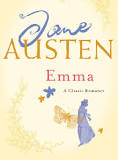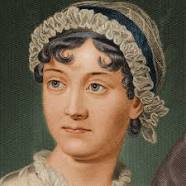Emma Page #23
Emma, by Jane Austen, is a novel about youthful hubris and the perils of misconstrued romance. The story takes place in the fictional village of Highbury and the surrounding estates of Hartfield, Randalls, and Donwell Abbey and involves the relationships among individuals in those locations consisting of "3 or 4 families in a country village". The novel was first published in December 1815 while the author was alive, with its title page listing a publication date of 1816. As in her other novels, Austen explores the concerns and difficulties of genteel women living in Georgian–Regency England; she also creates a lively comedy of manners among her characters and depicts issues of marriage, gender, age, and social status.
“Oh! dear, no,” said her companion. They walked on. The lane made a slight bend; and when that bend was passed, Mr. Elton was immediately in sight; and so near as to give Emma time only to say farther, “Ah! Harriet, here comes a very sudden trial of our stability in good thoughts. Well, (smiling,) I hope it may be allowed that if compassion has produced exertion and relief to the sufferers, it has done all that is truly important. If we feel for the wretched, enough to do all we can for them, the rest is empty sympathy, only distressing to ourselves.” Harriet could just answer, “Oh! dear, yes,” before the gentleman joined them. The wants and sufferings of the poor family, however, were the first subject on meeting. He had been going to call on them. His visit he would now defer; but they had a very interesting parley about what could be done and should be done. Mr. Elton then turned back to accompany them. “To fall in with each other on such an errand as this,” thought Emma; “to meet in a charitable scheme; this will bring a great increase of love on each side. I should not wonder if it were to bring on the declaration. It must, if I were not here. I wish I were anywhere else.” Anxious to separate herself from them as far as she could, she soon afterwards took possession of a narrow footpath, a little raised on one side of the lane, leaving them together in the main road. But she had not been there two minutes when she found that Harriet's habits of dependence and imitation were bringing her up too, and that, in short, they would both be soon after her. This would not do; she immediately stopped, under pretence of having some alteration to make in the lacing of her half-boot, and stooping down in complete occupation of the footpath, begged them to have the goodness to walk on, and she would follow in half a minute. They did as they were desired; and by the time she judged it reasonable to have done with her boot, she had the comfort of farther delay in her power, being overtaken by a child from the cottage, setting out, according to orders, with her pitcher, to fetch broth from Hartfield. To walk by the side of this child, and talk to and question her, was the most natural thing in the world, or would have been the most natural, had she been acting just then without design; and by this means the others were still able to keep ahead, without any obligation of waiting for her. She gained on them, however, involuntarily: the child's pace was quick, and theirs rather slow; and she was the more concerned at it, from their being evidently in a conversation which interested them. Mr. Elton was speaking with animation, Harriet listening with a very pleased attention; and Emma, having sent the child on, was beginning to think how she might draw back a little more, when they both looked around, and she was obliged to join them. Mr. Elton was still talking, still engaged in some interesting detail; and Emma experienced some disappointment when she found that he was only giving his fair companion an account of the yesterday's party at his friend Cole's, and that she was come in herself for the Stilton cheese, the north Wiltshire, the butter, the celery, the beet-root, and all the dessert. “This would soon have led to something better, of course,” was her consoling reflection; “any thing interests between those who love; and any thing will serve as introduction to what is near the heart. If I could but have kept longer away!” They now walked on together quietly, till within view of the vicarage pales, when a sudden resolution, of at least getting Harriet into the house, made her again find something very much amiss about her boot, and fall behind to arrange it once more. She then broke the lace off short, and dexterously throwing it into a ditch, was presently obliged to entreat them to stop, and acknowledged her inability to put herself to rights so as to be able to walk home in tolerable comfort. “Part of my lace is gone,” said she, “and I do not know how I am to contrive. I really am a most troublesome companion to you both, but I hope I am not often so ill-equipped. Mr. Elton, I must beg leave to stop at your house, and ask your housekeeper for a bit of ribband or string, or any thing just to keep my boot on.” Mr. Elton looked all happiness at this proposition; and nothing could exceed his alertness and attention in conducting them into his house and endeavouring to make every thing appear to advantage. The room they were taken into was the one he chiefly occupied, and looking forwards; behind it was another with which it immediately communicated; the door between them was open, and Emma passed into it with the housekeeper to receive her assistance in the most comfortable manner. She was obliged to leave the door ajar as she found it; but she fully intended that Mr. Elton should close it. It was not closed, however, it still remained ajar; but by engaging the housekeeper in incessant conversation, she hoped to make it practicable for him to chuse his own subject in the adjoining room. For ten minutes she could hear nothing but herself. It could be protracted no longer. She was then obliged to be finished, and make her appearance. The lovers were standing together at one of the windows. It had a most favourable aspect; and, for half a minute, Emma felt the glory of having schemed successfully. But it would not do; he had not come to the point. He had been most agreeable, most delightful; he had told Harriet that he had seen them go by, and had purposely followed them; other little gallantries and allusions had been dropt, but nothing serious. “Cautious, very cautious,” thought Emma; “he advances inch by inch, and will hazard nothing till he believes himself secure.” Still, however, though every thing had not been accomplished by her ingenious device, she could not but flatter herself that it had been the occasion of much present enjoyment to both, and must be leading them forward to the great event. CHAPTER XI Mr. Elton must now be left to himself. It was no longer in Emma's power to superintend his happiness or quicken his measures. The coming of her sister's family was so very near at hand, that first in anticipation, and then in reality, it became henceforth her prime object of interest; and during the ten days of their stay at Hartfield it was not to be expected--she did not herself expect--that any thing beyond occasional, fortuitous assistance could be afforded by her to the lovers. They might advance rapidly if they would, however; they must advance somehow or other whether they would or no. She hardly wished to have more leisure for them. There are people, who the more you do for them, the less they will do for themselves. Mr. and Mrs. John Knightley, from having been longer than usual absent from Surry, were exciting of course rather more than the usual interest. Till this year, every long vacation since their marriage had been divided between Hartfield and Donwell Abbey; but all the holidays of this autumn had been given to sea-bathing for the children, and it was therefore many months since they had been seen in a regular way by their Surry connexions, or seen at all by Mr. Woodhouse, who could not be induced to get so far as London, even for poor Isabella's sake; and who consequently was now most nervously and apprehensively happy in forestalling this too short visit.
Translation
Translate and read this book in other languages:
Select another language:
- - Select -
- 简体中文 (Chinese - Simplified)
- 繁體中文 (Chinese - Traditional)
- Español (Spanish)
- Esperanto (Esperanto)
- 日本語 (Japanese)
- Português (Portuguese)
- Deutsch (German)
- العربية (Arabic)
- Français (French)
- Русский (Russian)
- ಕನ್ನಡ (Kannada)
- 한국어 (Korean)
- עברית (Hebrew)
- Gaeilge (Irish)
- Українська (Ukrainian)
- اردو (Urdu)
- Magyar (Hungarian)
- मानक हिन्दी (Hindi)
- Indonesia (Indonesian)
- Italiano (Italian)
- தமிழ் (Tamil)
- Türkçe (Turkish)
- తెలుగు (Telugu)
- ภาษาไทย (Thai)
- Tiếng Việt (Vietnamese)
- Čeština (Czech)
- Polski (Polish)
- Bahasa Indonesia (Indonesian)
- Românește (Romanian)
- Nederlands (Dutch)
- Ελληνικά (Greek)
- Latinum (Latin)
- Svenska (Swedish)
- Dansk (Danish)
- Suomi (Finnish)
- فارسی (Persian)
- ייִדיש (Yiddish)
- հայերեն (Armenian)
- Norsk (Norwegian)
- English (English)
Citation
Use the citation below to add this book to your bibliography:
Style:MLAChicagoAPA
"Emma Books." Literature.com. STANDS4 LLC, 2025. Web. 4 Jan. 2025. <https://www.literature.com/book/emma_29>.




Discuss this Emma book with the community:
Report Comment
We're doing our best to make sure our content is useful, accurate and safe.
If by any chance you spot an inappropriate comment while navigating through our website please use this form to let us know, and we'll take care of it shortly.
Attachment
You need to be logged in to favorite.
Log In